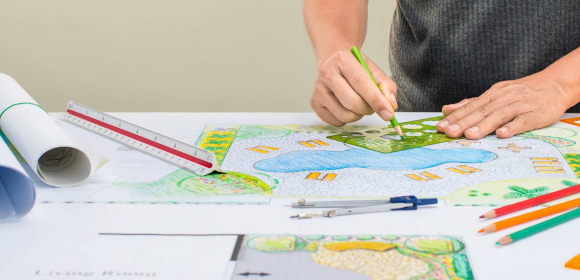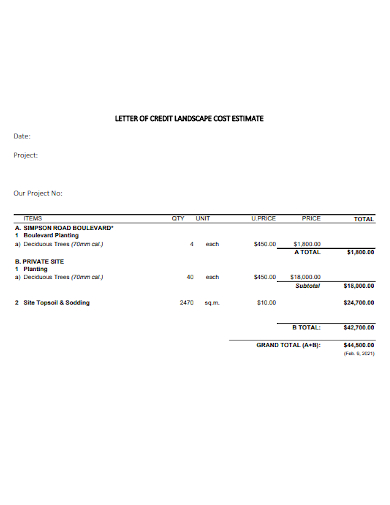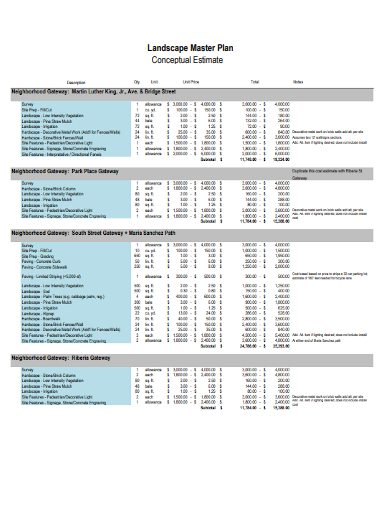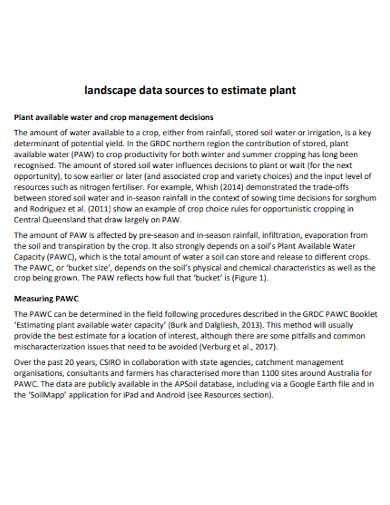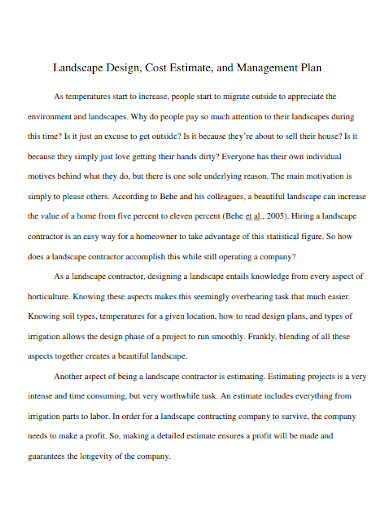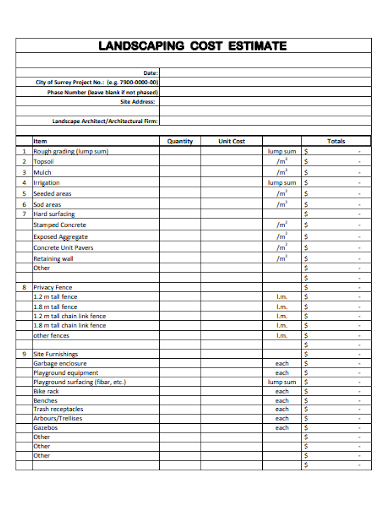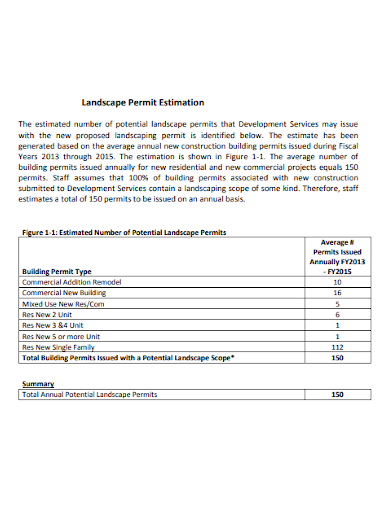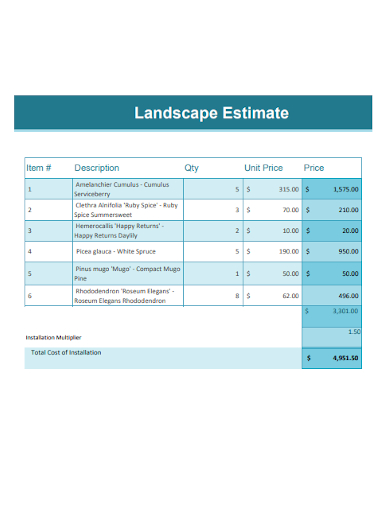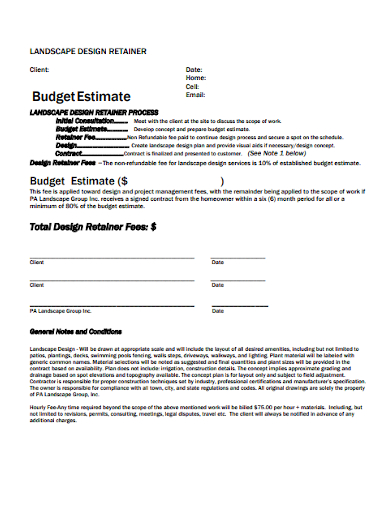A landscaping job is more than just designing lawns and yards and planting trees, shrubs, and bushes. You also need to master the art of estimating landscaping jobs for you to run a profitable business. If you flop on estimating the costs of your landscaping job can jeopardize the way you run your business. If you estimate way too high, your clients won’t work with you and go with your competitors. However, if you estimate way too low, you will lose money and you won’t earn any at all. So you need to know how to maintain a balance between those two extremes. So you need to know right away how you will be able to correctly estimate your next landscaping job. This article will guide you on how to create a landscaping estimate.
10+ Landscape Estimate Samples
1. Landscape Estimate Template
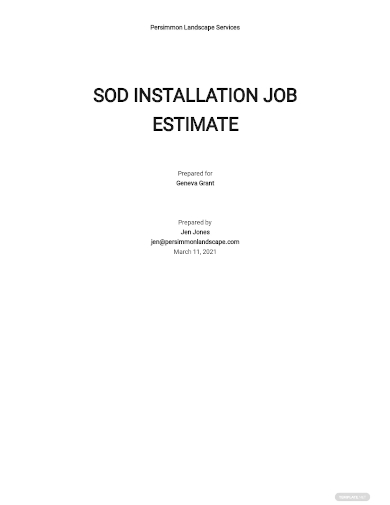
2. Landscape Maintenance Estimate
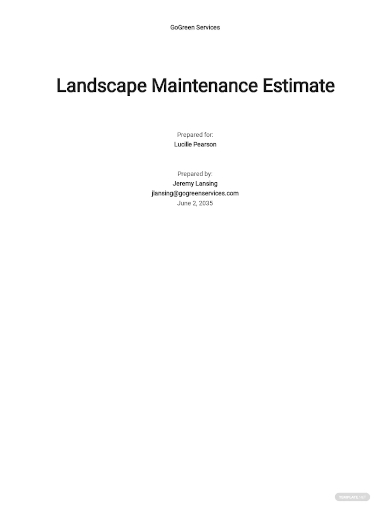
3. Landscape Bid Estimate
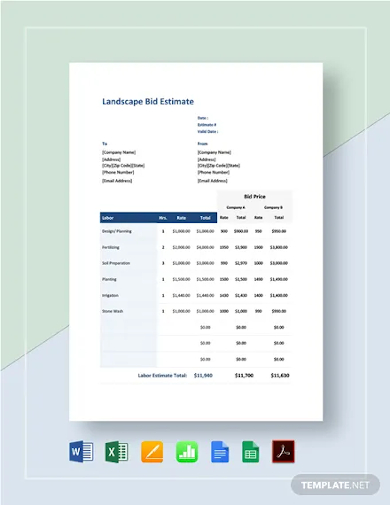
4. Letter of Credit Landscape Cost Estimate
5. Landscape Master Plan Conceptual Estimate
6. Landscape Data Sources to Estimate Plant
7. Landscape Design & Cost Estimate and Management Plan
8. Landscape Cost Estimate
9. Landscape Permit Estimation
10. Sample Landscape Estimate
11. Landscape Design Retainer Budget Estimate
Benefits of Landscape
There are a lot of benefits of landscaping work in parks, homes, and other outdoor spaces. Below are some of the benefits landscaping can provide to both humans and the environment:
- It acts as natural coolants: Grass is much cooler than asphalt or cement so it acts as an air conditioner in its surrounding area which lessens the humidity. And if there are lots of trees, its shades can reduce temperatures inside the house.
- It also cleans the environment: Grass also plays an important role in capturing carbon dioxide, dust, smoke particles, and other pollutants in the air. In return, they produce oxygen.
- It acts as a water protector too: The plants and grass in lawns absorb unhealthy water runoff that might filter into bodies of water, especially the clean, fresh ones.
- They help minimize noise: Lawns and plants can help reduce noise pollution; in fact, they can reduce noise levels by 20 percent to 30 percent compared to hard surfaces like concrete and pavement.
How to do a Landscape Estimate
1. Talk to the Client
The first thing to do is to talk to the client about what they want. Ask them questions about their landscape style preference. Visit their property and measure it. Discuss with your client the materials needed for the job and the type of labor that you will be doing. Furthermore, you also need to discuss what features will be required for the landscape, the types of plants that will be planted, the current condition of the yard, and the quality of the soil. You also need to consider if you need to remove or add soil if you need to slope the yard or get rid of plants and other features.
2. Estimate Overhead Costs
It’s time to start estimating costs once you’ve gathered the information you need. First, estimate the overhead cost. Vans, gas, advertising, office rent, equipment repair and maintenance, cell phones, tools, uniforms, accountants, and insurance are some examples of overhead costs. Make sure to have an accurate amount of each expense. You also need to add up your weekly overhead costs and divide them between the number of hours you work per week on average. Then add that amount to the job cost, based on the estimated number of hours the landscaping project is going to last.
3. Estimate Materials Costs
It’s time to estimate the materials costs. List down all the materials you will need for the project. Calculate how many you will need based on your measurements. Add every cost and the total will be the whole cost of the materials you will use. Add the amount to the total project cost.
4. Estimate Subcontractor Costs
Send your subcontractor the project specifications of the landscaping job and ask them to quote you a price. Add their price to the total project cost.
5. Estimate Labor Costs
Add the hourly rate to the number of hours you and your other employees will work on a day for the project. This is one way to calculate your labor cost.
6. Add Your Markup
The markup should be applied on top of the total cost of the job so you can make a profit from the project. You can charge around 15 percent markup on residential landscaping jobs, 10 to 15 percent on commercial landscaping jobs, and 10 to 12 percent on maintenance landscaping.
7. Calculate the Total Price
Add up all the costs you listed including the markup and the total sum is the price quote of the landscaping project. If the state you’re in requires to include a sales tax, include that as well in the price quote.
FAQs
How much does landscaping cost per square foot?
Landscaping costs $5 to $35 per square foot. The national average of landscaping a 1,200 square foot yard is $13,200. The cost will vary from how extensive the work will be and how many materials will be used.
How much are plants marked up?
The markup on cost percentage with plants may vary by product line. The markup on smaller trees can go up to 150 percent while the markup on large trees will be around 75 percent.
How much should one spend on landscaping?
If you’re planning to do some landscaping in your yard, spend around 10% of your home’s value.
To get the most out of your estimation, enhance your estimating process regularly. Analyze how you do your estimation or have an expert do the analysis. This will help you address which areas you need to improve so you can ensure that you will earn higher profits and make your client happy at the same time. To help you get started making your landscape estimate, download our free sample templates above to use as your guide!
Related Posts
Retirement Speech Samples & Templates
Weekly Schedule Samples & Templates
Contractual Agreement Samples & Templates
FREE 9+ Amazing Sample Church Bulletin Templates in PSD | PDF
Sample Business Card Templates
Sample Cashier Job Descriptions
Questionnaire Samples
FREE 10+ Sample HR Resource Templates in PDF
FREE 10+ HR Consulting Business Plan Samples in MS Word | Google Docs | Pages | PDF
FREE 49+ Sample Job Descriptions in PDF | MS Word
FREE 13+ Academic Calendar Templates in Google Docs | MS Word | Pages | PDF
FREE 10+ How to Create an Executive Summary Samples in Google Docs | MS Word | Pages | PDF
FREE 23+ Sample Event Calendar Templates in PDF | MS Word | Google Docs | Apple Pages
Company Profile Samples
FREE 10+ Leadership Report Samples [ Development, Training, Camp ]
